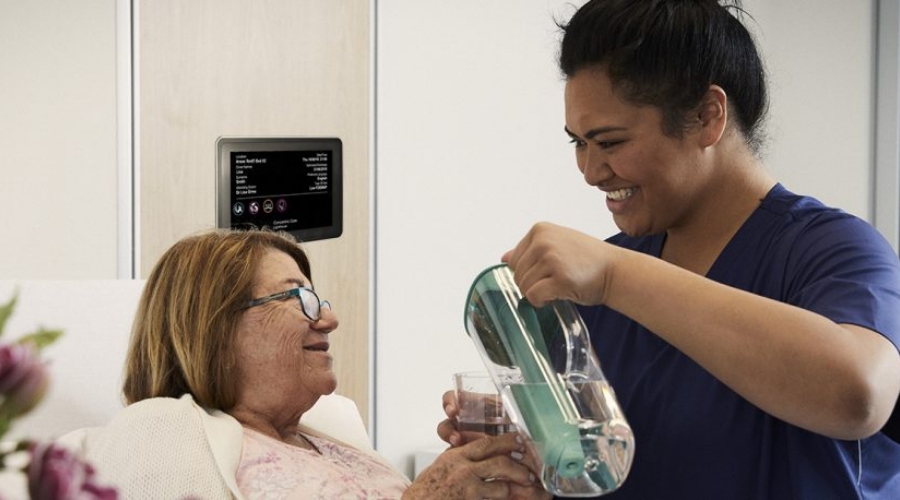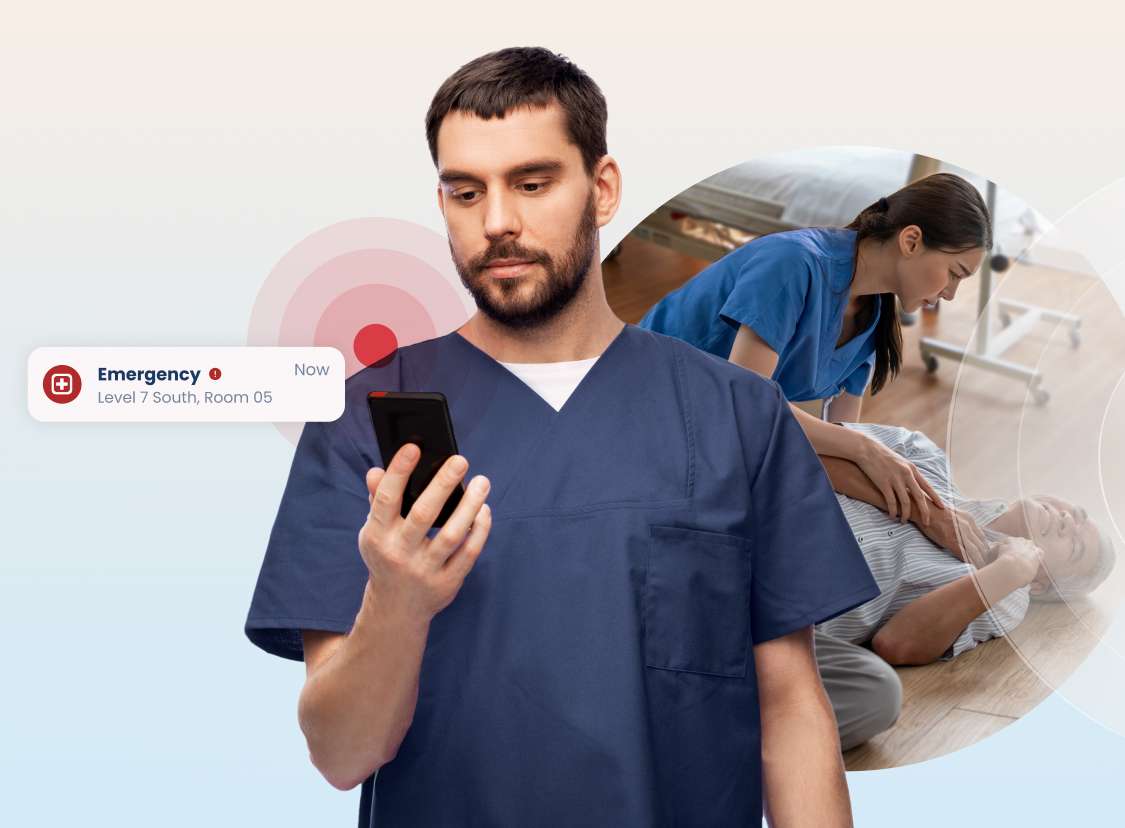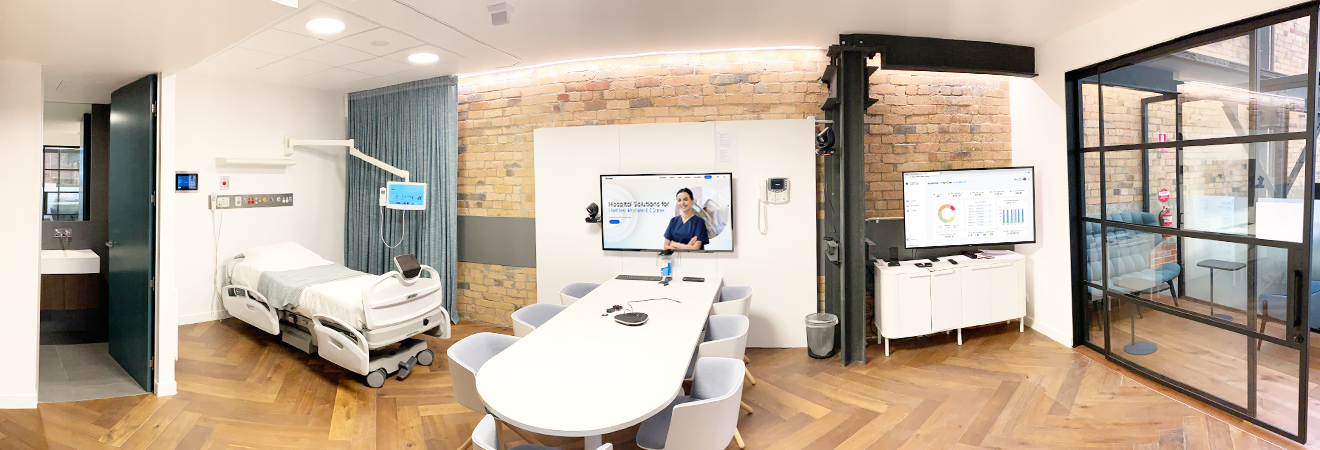
Share:
Gold Coast University Hospital in Queensland has conducted a silent In-Patient Unit (IPU) trial as part of its ‘Releasing Time to Care’ initiative, focused on giving clinical teams more time with patients, while empowering them to improve safety, quality and delivery of care.
The Hospital completed the silent trial using the Rauland Australia Focused Patient Care® solution, integrated with its Responder nurse call and workflow solution. Gold Coast University Hospital (GCUH) is a major health facility located in Southport on the Queensland Gold Coast. GCUH is a 750-bed medical facility offering secondary and tertiary level health care across more than 20 facilities with services including: specialist cancer and cardiac services, neurosciences, trauma and neonatal intensive care.
‘Releasing Time to Care’ is an evidence-based, patient focused continuous improvement program. The initiative is designed to enable inpatient unit-based teams to redesign and streamline the way they work; with the goal of freeing up more time to care for patients, leading to improved patient safety and outcomes, and improved staff well-being.
The silent In-patient Unit trial saw all annunciators silenced and patient requests directed through to the relevant nurses’ phones, allowing them to call back to the room to speak with the patient from anywhere in the unit. By implementing silent notifications without annunciator alarms, Gold Coast University Hospital achieved a 61% reduction in alarm noise¹. This is a significant step towards reducing alarm fatigue amongst staff and improving patient safety outcomes.
Healthcare staff are typically exposed to hundreds of alarms during each shift; researchers believe that the number of alarms may be in excess of 1000 alarms per shift. This may lead to staff becoming desensitised to the alarm, which in turn may lead to a delayed or inadequate response to the alarm. This is known as alarm fatigue. In 2015, the US Food and Drug Administration reported more than 500 alarm-related patient deaths across a period of five year².
Staff satisfaction measures showed a 54% improvement in nurses considering the ward a quieter and more restful environment³. Nurses also reported that the silent ward helped them determine their patients’ needs more quickly and be more responsive to patients, as they were able to prioritise their response and gather equipment or medication before attending to the patient in person.
Improved continuity of care and patient safety was also achieved by connecting patients directly to their nurse. During the trial staff notifications were reduced by 66%, with staff response times averaging 48 seconds when using voice, and patient falls decreased by 25%.
References:
1. Gold Coast Hospital and Health Service and Rauland Australia conducted a proof of concept trial of a silent ward environment in Ward C6E; an in-patient unit at Gold Coast University Hospital (GCUH). The trial was conducted as part of the Releasing Time to Care program between 23rd August 2019 and 17th December 2019.
2. Ruskin, Keith J. and Hueske-Kraus, Dirk. Alarm fatigue: impacts on patient safety. Current Opinion in Anaesthesiology. 28(6):685-690, December 2015.
3. Taken from GCUH patient and staff surveys to measure perception of patient satisfaction, appropriateness of the technology changes, and overall satisfaction of nursing staff.
Share:
Related Content

- 24 February 2025
- 5 min read
Enhancing Staff Safety at Maitland Hospital with Mobile Duress
Discover how Maitland Hospital implements mobile duress technology to safeguard people safety in healthcare.
- Hospital

- 7 February 2025
- 5 min read
Effective Real-Time Location Systems (RTLS) in Healthcare: How to make the right choice for your facility’s needs
Understand the key considerations for healthcare decision makers when investing in RTLS-based digital health solutions.
- Enterprise
- Hospital
- Aged Care

- 6 January 2025
- 5 min read
Your Gateway to Better Care: Our Concentric Care platform in action
Our Experience Centre offers healthcare professionals a hands-on experience with our digital solutions that enhance patient care and transform healthcare delivery.
- Aged Care
- Rauland
- Hospital

- 24 February 2025
- 5 min read
Enhancing Staff Safety at Maitland Hospital with Mobile Duress
Discover how Maitland Hospital implements mobile duress technology to safeguard people safety in healthcare.
- Hospital

- 7 February 2025
- 5 min read
Effective Real-Time Location Systems (RTLS) in Healthcare: How to make the right choice for your facility’s needs
Understand the key considerations for healthcare decision makers when investing in RTLS-based digital health solutions.
- Enterprise
- Hospital
- Aged Care

- 6 January 2025
- 5 min read
Your Gateway to Better Care: Our Concentric Care platform in action
Our Experience Centre offers healthcare professionals a hands-on experience with our digital solutions that enhance patient care and transform healthcare delivery.
- Aged Care
- Rauland
- Hospital
